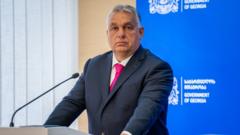Hungarian Prime Minister Viktor Orban's recent visit to Georgia has drawn intense scrutiny as he publicly praised the government's election victory that many are contesting. Just three days following the election results, which saw the ruling Georgian Dream party declared the winner amidst allegations of widespread irregularities, Orban's endorsement has been met with disapproval from various international bodies.
During his Tbilisi visit, Orban labeled the election as "free and democratic," conveniently ignoring the numerous reports of violations. The European Union has responded by stating that their observers did not find the elections to be fair and expressed concerns about the situation in Georgia. Notably, Georgian President Salome Zourabichvili did not acknowledge the election results, linking them to an alleged “Russian special operation” aimed at influencing the outcome.
Despite significant protests against the election results, Orban did not shy away from criticizing the EU's reaction, asserting that European politics often bias opinions based on ideological lines. “If liberals win, it’s called democracy, but if conservatives win, there’s no democracy,” he remarked post-meeting with Georgian Prime Minister Irakli Kobakhidze. His comments prompted a wave of criticism, with both the US and EU calling for a transparent and independent investigation into claims of violence and intimidation surrounding the election process.
The Georgian monitoring organization "My Vote" has documented extensive irregularities during the elections, suggesting that the voting process was manipulated. Allegations include coercion of voters, vote-buying, and instances of “carousel voting” where voters were able to cast multiple votes. The Georgian election commission, however, refuted these claims, indicating that proper measures were enforced to ensure electoral integrity.
Georgia's political turmoil continues as the Georgian Dream party, accused of steering the nation closer to Russia, stands firm in its claim of electoral success, while opposition parties and civil society groups call for scrutiny of the voting process. With the country divided and tensions high, Orban's controversial visit and endorsement of the Georgian government only adds fuel to the fire, as many believe that the future of Georgia's democracy hangs in the balance.




















